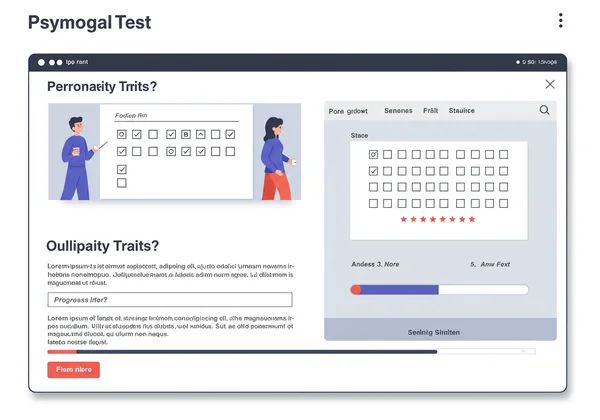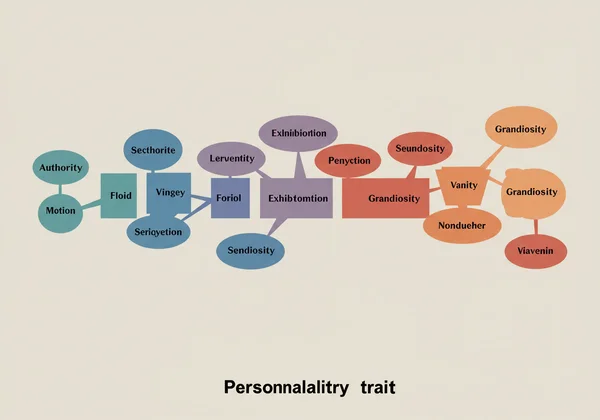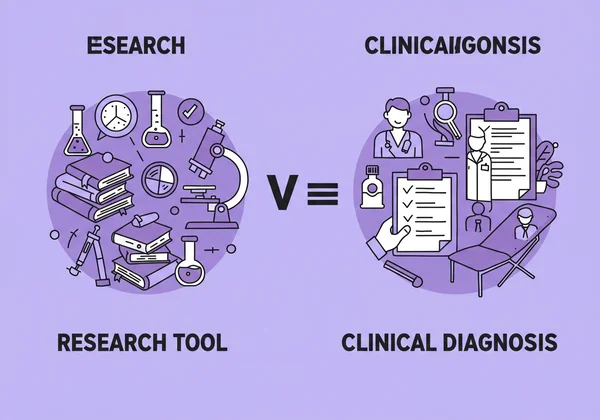檢測自戀:了解 NPI 及其局限性
July 13, 2025 | By Rowan Thorne
您是否曾好奇過自己的個性有何細微之處,特別是與自信或自我關注相關的方面?對於尋求「自我洞察」的人來說,「 NPI 測驗說明 」是一個常見的探討主題。但「 我如何知道自己是否是自戀者? 」這個問題,經常會引導人們進行性格評估。雖然沒有任何單一的線上測驗能提供臨床診斷,但受現有心理量表啟發的工具,例如我們「 平台 」上的測驗,為自我反思提供了寶貴的起點。這些評估可以幫助您探索自己的特質,並了解您在廣泛的「 自戀光譜 」上可能處於哪個位置。您可以透過進行我們的「 免費線上自戀測驗 」來開始您的個人探索。

什麼是自戀人格量表 (NPI)?
「 自戀人格量表 」(NPI) 是社會與人格「 心理研究 」中最廣泛使用的次臨床自戀衡量標準。它由 Raskin 和 Hall 於 1979 年開發,用於評估一般人群中的自戀「 性格特質 」,並不一定表示患有障礙。您可以將其視為一種衡量一個人表現出自戀特質的程度的工具,例如誇大、虛榮或對讚美的渴望,這些都是常與自戀相關的組成部分。它有助於我們理解個體間自我肯定的譜系。
NPI 的起源與發展
NPI 最初是根據 DSM-III(精神疾病診斷與統計手冊,第三版)中的自戀型人格障礙 (NPD) 的診斷標準改編而來。然而,它本身從未被設計為「 診斷工具 」。相反地,研究人員 Raskin 和 Hall 設計它是為了衡量非臨床人群中的自戀特質。數十年來,它經過不斷改進,並被廣泛用於研究這些特質的表現方式及其對人際關係、領導風格等生活各個方面所產生的影響。它在學術界的廣泛使用,突顯了其在理解人類行為和人格動態方面的重要性。
NPI 測驗的結構
通常,NPI 有多種版本,其中最常見的是 40 道題的選擇題問卷。每道題目都呈現兩個陳述,受試者選擇最能描述自己的那一個。例如,一個選項可能反映一種自戀傾向,而另一個選項則反映非自戀傾向。在我們「 網站 」上,我們免費的「 自戀測驗 」採用了受 NPI 啟發的 20 道題目格式,用戶需對陳述進行五點量表。這種高效的結構允許進行快速且便捷的初步「 自戀評估 」,並提供即時結果。若要了解我們的工具如何幫助您探索這些特質,請考慮今天就進行「 線上自戀評估 」。

NPI 評估所測量的主要維度
「 NPI 評估 」不僅提供單一分數,通常還能提供洞察自戀特質的不同面向。雖然具體的次量表在不同版本的 NPI 中可能略有差異,但它們通常旨在捕捉與自戀相關的獨特「 行為模式 」。理解這些維度,能對個人的傾向提供更細緻的視角。
探索常見的 NPI 次量表(例如:權威、表現主義、剝削性)
原始的 NPI 通常被細分為幾個次量表,每個次量表代表自戀的一個獨特方面。這些包括:
- 權威 :反映領導抱負和影響他人的願望。
- 表現主義 :捕捉成為關注焦點和獲得讚美的需求。
- 剝削性 :衡量利用他人達成個人目標的意願。
- 誇大 :表明自我重要感和獨特性的膨脹。
- 自給自足 :指出對自身能力和獨立性的過度自信。
- 優越感 :反映對自己地位高於他人的信念。
- 虛榮 :衡量對外表的癡迷。
這些次量表有助於全面描繪自戀傾向在個人思想和行為上可能如何表現出來。探索這些特定領域可以帶來更大的「 自我覺察 」。

解釋您的 NPI 分數:數字的意義為何?
您在我們「 網站 」上類似的 NPI 啟發式評估中的分數,表明了您在多大程度上展現出這些自戀的「 性格特質 」。較高的分數表明這些特質的傾向較強。重要的是要記住,這些分數是連續性的。每個人有時都會表現出一些自戀特質,例如健康的自尊或對認可的需求。NPI 有助於衡量這些特質的強度。高分並不意味著一個人患有自戀型人格障礙;它僅僅表明了這些特定特質的較強存在。若要更清楚地了解您自己的分數,完成評估後,您可以到我們網站上「 解釋您的結果 」。
NPI 測驗的準確性:研究工具 vs. 臨床診斷
在討論「 NPI 測驗準確性 」時,務必強調其預期用途。NPI 是研究自戀特質方面一個強大且經過廣泛驗證的工具。然而,其準確性體現在其作為研究和自我反思工具的用途上,而非診斷工具。
為何 NPI 不是 NPD 的診斷工具
這或許是最關鍵的區別:NPI 絕非 自戀型人格障礙 (NPD) 的「 診斷工具 」。NPD 是一種複雜的精神健康狀況,需要由合格的心理健康專業人士進行全面的「 臨床評估 」。此類評估包括深入訪談、觀察,並根據 DSM-5 中概述的特定診斷標準來 對照 個人的病史和症狀。線上「 自戀型人格障礙測驗 」或 NPI 評估只能指出某些特質的存在。它無法確定這些特質是否符合正式 NPD 診斷所需的嚴重程度、廣泛性及顯著困擾標準。我們「 平台 」明確說明了這一限制,強調其在「 自我反思 」和教育方面的作用,而非診斷。

NPI 在心理學研究中的作用
儘管不是診斷工具,NPI 在「 心理學研究 」中卻扮演著重要的角色。它在無數研究中發揮了關鍵作用,這些研究探討了不同人群中自戀特質的盛行率、自戀與其他人格維度的相關性,以及其對社交互動、人際關係和職業成功的影響。研究人員利用它來理解健康與不健康自尊、攻擊性、同理心和領導力的心理基礎。它作為學術和臨床研究中可靠測量方法的效用,鞏固了其作為科學界重要「 人格評估 」工具的地位。
透過理解 NPI 來擁抱自我覺察
「自戀人格量表」(NPI) 作為一個有價值的工具,可以幫助探索與自戀相關的「 性格特質 」。它提供了一種結構化的方式來釐清您或您認識的人在這些特質的光譜上可能處於哪個位置。請記住,NPI 用於自我探索和研究,提供對特定傾向的「 自我洞察 」,而非臨床診斷。
透過以清晰、負責任的方式理解闡釋清晰、負責任的免費「 NPI 測驗 」,您可以獲得更大的「 自我覺察 」機會。我們「 平台 」提供了一個易於取得且受 NPI 啟發的線上「 自戀測驗 」,專為初步篩查設計。這是您開始自我發現之旅的快速且保密的方式,幫助您更好地了解自己以及與世界的互動方式。
您準備好探索自己的特質並發現洞見了嗎?立即訪問我們「 網站 」來「 開始您的評估 」並獲得清晰的認識。
關於 NPI 測驗的常見問題
NPI 測驗是 NPD 的診斷嗎?
不,NPI 測驗 絕非 用於診斷自戀型人格障礙 (NPD) 的工具。它用於衡量一般人群中的自戀「 性格特質 」。NPD 的診斷只能由合格的心理健康專業人士透過全面的「 臨床評估 」來做出。
NPI 測驗有多準確?
就其預期用途而言,「 NPI 測驗準確性 」很高:即在研究和自我探索情境中衡量次臨床自戀特質。它是心理學研究中廣泛驗證且可靠的衡量標準。然而,其準確性不應與其診斷能力混淆,這是它無法做到的。
誰可以從進行 NPI 評估中受益?
對「 自我反思 」和了解自身「 性格特質 」感興趣的個人,都可以從中獲益良多。心理學的學生和專業人士也可以將其作為一個廣泛認可的「 人格評估 」工具的範例。它為「 自我覺察 」提供了一個入門。您可以在我們網站上進行免費的「 自戀評估 」。
什麼是自戀人格量表?
「 自戀人格量表 」(NPI) 是一種心理問卷,旨在衡量非臨床人群中的自戀特質。它包含一系列陳述或選擇題項目,供個人回應,反映其在誇大、優越感、表現主義和其他自戀特徵方面的傾向。
這個工具與 NPI 有何關聯?
「 此工具 」受 NPI 啟發,提供一個免費、快速的 20 道題目「 自戀測驗 」,用於初步自我篩檢。它提供了一種便捷的方式來探索您的自戀傾向,並了解您在「 自戀光譜 」上的可能位置。它旨在提供即時、有見地的結果,用於自我反思和教育,而非臨床診斷。您可以「 立即查看您的結果 」。